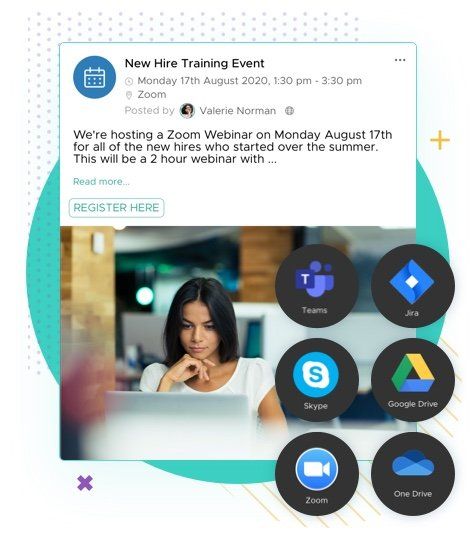Gen Z in the Workforce: What Employers Need to Know about the Next Generation

Barry Nyhan
Senior Demand Gen & Marketing Ops
September 17 2020

By Sean Conlon
MOVE OVER, MILLENIALS.
The next generation is entering the workforce, bringing a fresh perspective and a different worldview.
Born between 1995 and 2010, Gen Z already makes up over 20 percent of the US workforce. Digital natives that have grown up with social media, Gen Z eclipses Gen Y and even millennials in their tech-savviness.
In the first of a series of posts looking at the future of work, we examine the implications of Gen Z’s arrival in the workplace. The global pandemic has undoubtedly transformed the way we work for the foreseeable. So, the time is ripe for employers to take a fresh look at their culture and communications to ensure they align with changing attitudes.
What can employers expect from this new generation of employees? Like any generation, Gen Zers are a diverse group. But there are some common characteristics that employers will need to factor into their people strategies.

Gen Z at work are socially connected and tech-savvy.
If you think millennials are technology-obsessed, then Gen Z takes things to a new level. Whether it’s for work, research, or staying socially connected, Gen Zers use technology in every aspect of their lives. They are used to information on demand. And they consume vast amounts of data across multiple platforms on a daily basis.
Gen Z is also the first generation to grow up in the full glare of social media. Snapchat, Instagram, and TikTok are an integral part of Gen Zers’ lives both professionally and personally.
Despite their digital connectedness, or perhaps because of it, Gen Z also craves face-to-face communications. Unlike millennials who prefer email, text, or instant messaging, Gen Z likes the personal touch.
So, what does this mean for employers?
Well, in one survey from tech giant, Dell, 91% said the technology an employer offers influences their job choice. When it comes to the workplace, Gen Zers will expect technological solutions that provide gateway access to multiple platforms. Integrated, ready-access to workplace tools and apps is the way to engage this generation. And it almost goes without saying that mobile access is a must.
Furthermore, employers will increasingly need to look to communications platforms that mirror the social experience Gen Z is familiar with. After all, many of this new breed of workers will be starting their careers working remotely. In the absence of the office water cooler, connecting with their colleagues in an employee-driven communications platform is a must.
Gen Zers are used to personalized communications channels. For example, the ‘recommended for you’ section on Netflix, or Instagram’s explore button, present users with targeted, relevant content. And Gen Z will likely expect the same at work.

Generation Z Workplace expectations:
They are more risk-averse and crave stability.Members of Gen Z do not like to take risks. In fact, they crave stability and security. It’s probably not surprising when you consider this generation has already experienced a Global Financial Crisis and now a worldwide pandemic. The uncertainty and unrest these young people have seen in their short lives have undoubtedly affected their worldview.
So, while millennials typically change jobs every two years or so, Gen Zers are likely to stay in the job longer. According to one recent survey, the top career goal for Gen Z is to work in a role that’s stable and secure.
What are the implications for employers of this need for stability?
This new generation of workers values employers who provide job security. Opportunities for personal development and career progression will be important to keep Gen Zers engaged.
Employers should look to develop internal mentorship and knowledge sharing programs. And promote learning opportunities within the organization with, for example, explainer videos, webinars, and podcasts. These options are a natural fit with tech-savvy Gen Zers who are working remotely.
However, perhaps most important of all is the right company culture. Gen Zers are well-informed about current affairs and the big issues in society. And they want to make a difference.
This generation will be attracted to employers with strong company cultures. Businesses that know where they are going and are good at communicating that vision will attract the best Gen Z talent. Employers should try to closely link the Gen Z employee’s daily tasks to organizational goals and values. A highly visible and accessible company culture is a must-have for Gen Z.
Gen Z at work:
Flexible, independent workers.
From desktop computers to smartphones and tablets, Gen Zers are used to anytime, anywhere, and any place working. Flexible and independent, Gen Zers have taken to remote working like the proverbial duck to water. Online collaboration, communication, and engagement come naturally to them.
However, in-person relationships and face-to-face communication are still important to these young people.
Despite the stereotype of being glued to their phones, the people side of work matters to Gen Z.
What does this mean for employers?
Flexibility and freedom are top of the wish list for Gen Zers starting their careers. According to research in Forbes, 73% of respondents said a healthy work-life balance was a priority. Therefore, Gen Zers are likely to embrace the move away from 9 to 5 office-based working to more flexible, remote options.
Employers looking to attract Gen Z candidates should offer a range of flexible work options. And they need to empower Gen Zers with the tools and technology required to support that independence. At the same time, employers have to satisfy the desire for social connection and community that’s important to Gen Z.

The Future of Work:
How prepared are you?
The arrival of Gen Z in the workplace means the future is already here. Now’s the time to review your people strategies and communications platforms to ensure they are fit for purpose.
Looking for an employee communications app that meets the needs of current and future employees? Check out how we built our employee communication platform for the modern workplace.